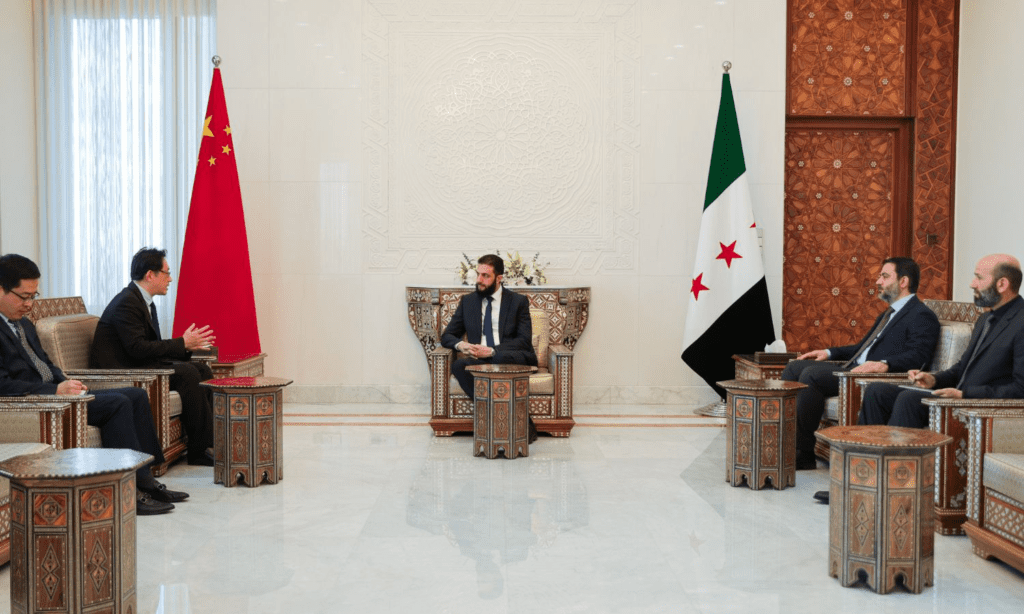Chinese officials face an uphill battle in managing relations with Syria’s new interim government following the collapse of Bashar al-Assad’s regime in December 2024. Both seem desirous to find ways to re-engage, but the gap between expectations for the moment remains too wide. Beijing wants the foreign terrorist threat removed from Syria. Syrian authorities, however, are unlikely to comply—at least not in the near term—due to regime stability concerns. For Damascus, removing these actors risks fracturing its already fragile governing coalition. For Beijing, their continued presence crosses a red line.
On July 29, Chinese Ambassador Shi Hongwei met with Syrian Foreign Minister Asaad al-Shibani in Damascus. The meeting occurred as hostilities intensified in Syria’s Suweida province between Sunni armed groups and Druze community forces, leaving dozens dead. Shi reiterated Beijing’s respect for Syrian sovereignty and condemned Israeli attacks and interference on Syrian territory—statements that were undoubtedly welcomed by Damascus. Reading between the lines, however, China’s hesitancy was quietly evident. Beijing did the least it could do, but also the most it would do.
A day earlier in New York, China’s United Nations Ambassador Fu Cong addressed the UN Security Council (UNSC) on turbulence in Syria, but took a more nuanced and critical tone. While affirming support for Syria’s transitional process, he voiced serious concern over the violence in Suweida and called on Syrian authorities to investigate civilian casualties. He went further—highlighting China’s growing unease with the integration of Syrian foreign fighters, many sanctioned by the UN for terrorism, into the Syrian military. Specifically, he linked these militants who were involved in the Latakia massacres earlier this year with recent clashes in Suweida, warning that tolerating their presence amounted to “nurturing a tiger to harm oneself.” Notably, Ambassador Fu referred to the “Syrian interim authorities,” not the Syrian government—signaling a conscious rhetorical distancing.
These two engagements—Shi in Damascus and Fu at the UN—mark important developments. China is continuing diplomatic contact and seeking minimal forms of cooperation. But its willingness to elevate ties remains constrained by two key issues: Beijing’s concern over the presence and possible empowerment of foreign militants inside Syria, especially Chinese Uyghurs; and that Syria could become a platform for these forces to evolve into a larger threat inside China’s borders.
What Beijing Wants from Syria
China has been clear on its expectation of the new Syrian authorities: deliver an inclusive political transition under the tenets of the 2015 UNSC Resolution 2254 and remove the jihadist groups from Syria. More specifically, Beijing wants armed elements of the Uyghur-dominated Turkistan Islamic Party (TIP) operating in Syria, and aligned with the current Syrian authorities, to be removed.
Despite Beijing’s resolute support for the Assad regime and subsequent disappointment with its collapse, Chinese officials have opted for maintaining diplomatic ties with the new Syrian authorities. Beijing is hoping to keep an open channel for finding potential avenues of cooperation on Chinese core objectives and, when necessary, expressing discontent for policies that go against them. For China’s leadership, any hopes of achieving the first point—an inclusive political transition—is undermined by the residual threat of transnational jihadism and its destabilizing impact.
This position was reinforced for Chinese officials at least three times. The first was the decision by Syrian authorities to integrate foreign fighters into the Syrian ministry of defense—reportedly with the Trump administration’s blessing—and promoting a Uyghur fighter into a position of leadership. The second was the participation of Sunni jihadist groups in civilian massacres in the Alawite strongholds of Latakia and Tartous. The third is the ongoing clashes and reports of civilian casualties between the Druze and armed tribes in the town of Suweida.
For Beijing, the presence of foreign fighters in Syria, especially Uyghurs affiliated with TIP, is interpreted as a direct challenge to China’s internal security narrative. Chinese officials have warned for years of the risk posed by militants, especially TIP, receiving combat training in conflict zones like Syria. That Damascus appears willing to accommodate or even promote such actors in its post-war security architecture is viewed by Beijing as a provocation, and one that undermines the trust necessary for strategic partnership.
This point was underscored at the recent UNSC meeting, where Ambassador Fu cited a sanctions committee report suggesting the ongoing presence of jihadist fighters and their integration into the armed forces posed a threat to Syria’s stability. Not all member states of the committee shared this assessment, however. Nevertheless, TIP’s role in post-Assad Syria will remain a constant point of tension with China. If Syria’s new leadership wants UN sanctions removed, they know what is expected of them for Beijing’s approval.
What Syria Needs from China
China’s posture presents a constraint for Syria. On one hand, Damascus could benefit from Chinese economic support to jumpstart reconstruction, but the bigger issue is getting China to support or abstain in lifting UN sanctions. That effort hinges on a vote at the UNSC, where China holds one of the keys as a permanent member. Russia has already extended its tacit backing, inviting Syrian President Ahmed al-Sharaa to attend the upcoming Russia–Arab League Summit in October. Meanwhile, China has remained noncommittal. Its support is conditional and tied to specific actions around counterterrorism and internal stability.
Yet Damascus appears reluctant to fully align with Beijing’s demands due to regime stability concerns. The fighters Beijing wants removed are the same ones who helped Sharaa’s Hayat Tahrir al-Sham (HTS) overthrow Assad’s forces in December. Sharaa walks a tightrope, balancing internal and external calls to reform or remove radical elements among Syria’s military base, but doing so threatens to fragment the current authorities’ powerbase. This balancing act only grows more precarious amid the sectarian tensions now buffeting the country. China’s criticism of the violence in places like Suweida and Latakia, and its connection to state accommodation of jihadist groups, reinforces the chances that Beijing would likely veto any UNSC motion to lift sanctions on Syria.
So far, there has been little progress in reaching an understanding. In the meantime, Syrian officials are attempting to strengthen ties with other parties that happen to be close partners of China, and could influence Beijing down the road. Despite significant historical grievances with Russia, Syria’s new leadership has cautiously welcomed Moscow’s overtures to re-engage, and is quickly expanding its relations with Gulf states. If Russia or the Gulf Cooperation Council countries are willing to agree to lift UN sanctions on Syria, it is likely they may try to bring China along. Beijing will not want to be seen as blocking consensus in the international community.
In the absence of progress with Beijing, Syrian authorities have secured a sea change in U.S. policy earlier this year. The Trump administration lifted or suspended Syrian sanctions, amended U.S. terrorism designations to remove Syria’s top leaders from the list, and called on the UNSC to re-evaluate UN sanctions on Syria. These were the biggest initial hurdles. In addition, they have secured a range of trade, reconstruction and investment commitments from the Gulf states, Türkiye and Jordan. All of this has occurred without any Chinese reconstruction commitments or new deals for Syria.
Maintaining the “Two-Meter Alley”
Finding a pathway for Syria and China to strengthen ties will be difficult. China appears to be applying what Foreign Minister Wang Yi has described as the “two-meter alley” approach—maintaining respectful distance while protecting one’s own interests. That posture is reflected in China’s current engagement: continuing diplomatic contact while limiting substantive cooperation. This means no new Belt and Road projects, no aid packages and no push to accelerate sanctions relief. This allows Beijing to be close enough to influence outcomes, if necessary, but distant enough to avoid direct entanglement or reputational risk.
It is difficult to see how things get better in the near future, but they could easily get worse. If the U.S. pushes the UNSC to lift sanctions on Syria, China will be forced to either abstain or veto. The latter decision would strike a further blow to Sino-Syrian relations and create even more distance between the two sides.


